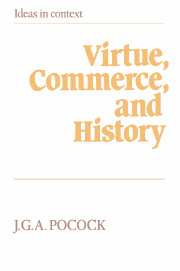 Virtue, Commerce, and History
Virtue, Commerce, and History Book contents
- Frontmatter
- Contents
- 1 Introduction: The state of the art
- PART I
- PART II
- 5 Modes of political and historical time in early eighteenth-century England
- 6 The mobility of property and the rise of eighteenth-century sociology
- 7 Hume and the American Revolution: The dying thoughts of a North Briton
- 8 Gibbon's Decline and Fall and the world view of the Late Enlightenment
- 9 Josiah Tucker on Burke, Locke, and Price: A study in the varieties of eighteenth-century conservatism
- 10 The political economy of Burke's analysis of the French Revolution
- PART III
- Index
7 - Hume and the American Revolution: The dying thoughts of a North Briton
Published online by Cambridge University Press: 05 May 2010
- Frontmatter
- Contents
- 1 Introduction: The state of the art
- PART I
- PART II
- 5 Modes of political and historical time in early eighteenth-century England
- 6 The mobility of property and the rise of eighteenth-century sociology
- 7 Hume and the American Revolution: The dying thoughts of a North Briton
- 8 Gibbon's Decline and Fall and the world view of the Late Enlightenment
- 9 Josiah Tucker on Burke, Locke, and Price: A study in the varieties of eighteenth-century conservatism
- 10 The political economy of Burke's analysis of the French Revolution
- PART III
- Index
Summary
This essay begins by exploring the second part of its title and then enlarges upon some wider implications of the first. That is to say, I want in the first instance to consider Hume's perception of the crises in English and American politics that marked the last decade and a half of his life and were at a crescendo when he died; and I want to consider what doing so may tell us about his perception of the historical world he was about to leave. I have emphasized the words “English” and “American” in order to hint, by exclusion, at something already implied by the title: that Hume's view of the British world in disruption was very much a view from Edinburgh; and my concern will be with Hume as publicist, historian, and political theorist, prior to Hume as philosopher. From Hume's perception of the American Revolution, I shall turn in conclusion to say something about his role in the ideological history of that great event, one as replete with paradox as even Duncan Forbes could desire.
The thrust of this paper is historicist, in the sense that it emphasizes Hume's consciousness of history and of the moment in history that his individual life had occupied and was about to leave. Neither his historiography nor his philosophy is historicist in any of the principal senses that word was later created to express. But Hume was a historian as well as a philosopher and, in the former role as well as the latter, one of the greatest of his century.
- Type
- Chapter
- Information
- Virtue, Commerce, and HistoryEssays on Political Thought and History, Chiefly in the Eighteenth Century, pp. 125 - 142Publisher: Cambridge University PressPrint publication year: 1985
- 7
- Cited by
